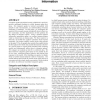Free Online Productivity Tools
i2Speak
i2Symbol
i2OCR
iTex2Img
iWeb2Print
iWeb2Shot
i2Type
iPdf2Split
iPdf2Merge
i2Bopomofo
i2Arabic
i2Style
i2Image
i2PDF
iLatex2Rtf
Sci2ools
ATAL
2008
Springer
2008
Springer
Modeling how humans reason about others with partial information
Computer agents participate in many collaborative and competitive multiagent domains in which humans make decisions. For computer agents to interact successfully with people in such environments, an understanding of human reasoning is beneficial. In this paper, we investigate the question of how people reason strategically about others under uncertainty and the implications of this question for the design of computer agents. Using a situated partialinformation negotiation game, we conduct human-subjects trials to obtain data on human play. We then construct a hierarchy of models that explores questions about human reasoning: Do people explicitly reason about other players in the game? If so, do people also consider the possible states of other players for which only partial information is known? Is it worth trying to capture such reasoning with computer models and subsequently utilize them in computer agents? We compare our models on their fit to collected data. We then construct comp...
| Added | 12 Oct 2010 |
| Updated | 12 Oct 2010 |
| Type | Conference |
| Year | 2008 |
| Where | ATAL |
| Authors | Sevan G. Ficici, Avi Pfeffer |
Comments (0)

